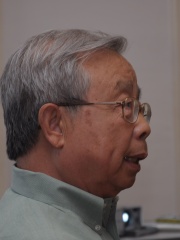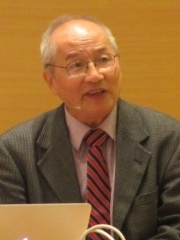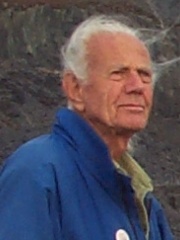



The Most Famous
ASTRONOMERS from China
This page contains a list of the greatest Chinese Astronomers. The pantheon dataset contains 644 Astronomers, 5 of which were born in China. This makes China the birth place of the 21st most number of Astronomers behind Spain, and Iran.
Top 5
The following people are considered by Pantheon to be the most legendary Chinese Astronomers of all time. This list of famous Chinese Astronomers is sorted by HPI (Historical Popularity Index), a metric that aggregates information on a biography's online popularity.

1. Gan De (400 BC - 400 BC)
With an HPI of 64.54, Gan De is the most famous Chinese Astronomer. His biography has been translated into 21 different languages on wikipedia.
Gan De (Chinese: 甘德; fl. 4th century BC), also known as the Lord Gan (Gan Gong), was an ancient Chinese astronomer and astrologer born in the State of Qi. Along with Shi Shen, he is believed to be the first in history known by name to compile a star catalogue, preceded by the anonymous authors of the early Babylonian star catalogues and followed by the Greek Hipparchus who is the first known in the Western tradition of Hellenistic astronomy to have compiled a star catalogue. He also made observations of the planets, particularly Jupiter. His writings are lost, but some of his works' titles and fragments quoted from them are known from later texts. Gan De may have been the first to describe one of the Galilean moons of Jupiter, usually invisible without the aid of telescopes. In the 20th century, a fragment of Gan's work, in a later compilation of astronomical texts, was identified by Xi Zezong as describing a naked-eye observation of either of the two largest and brightest moons, Ganymede or Callisto in summer 365 BC.

2. Fang Lizhi (1936 - 2012)
With an HPI of 59.29, Fang Lizhi is the 2nd most famous Chinese Astronomer. His biography has been translated into 26 different languages.
Fang Lizhi (Chinese: 方励之; pinyin: Fāng Lìzhī; February 12, 1936 – April 6, 2012) was a Chinese astrophysicist, vice-president of the University of Science and Technology of China, and activist whose liberal ideas inspired the pro-democracy student movement of 1986–87 and, finally, the Tiananmen Square protests of 1989. Fang was considered as one of the leaders of the New Enlightenment in the 1980s. Because of his activism, he was expelled from the Chinese Communist Party in January 1987. For his work, Fang was a recipient of the Robert F Kennedy Human Rights Award in 1989, given each year. He was elected an academician of the Chinese Academy of Sciences in 1980, but his position was revoked after 1989.

3. Jing Fang (78 BC - 37 BC)
With an HPI of 58.82, Jing Fang is the 3rd most famous Chinese Astronomer. His biography has been translated into 16 different languages.
Jing Fang (京房) (78–37 BC), born Li Fang (李房), courtesy name Junming (君明), was a Chinese music theorist, mathematician and astronomer born in present-day Puyang, Henan during the Han dynasty (202 BC – 220 AD). Although better known for his work in musical measurements, he also accurately described the basic mechanics of lunar and solar eclipses.

4. Frank Shu (1943 - 2023)
With an HPI of 54.36, Frank Shu is the 4th most famous Chinese Astronomer. His biography has been translated into 15 different languages.
Frank Hsia-San Shu (Chinese: 徐遐生; Jyutping: Ceoi4 Haa4 Sang1; June 2, 1943 – April 22, 2023) was a Chinese-American astrophysicist, astronomer, and author. He served as a Professor Emeritus at the University of California, Berkeley and University of California, San Diego. He is best known for proposing the density wave theory to explain the structure of spiral galaxies, and for describing a model of star formation, where a giant dense molecular cloud collapses to form a star.

5. John Dobson (1915 - 2014)
With an HPI of 53.07, John Dobson is the 5th most famous Chinese Astronomer. His biography has been translated into 17 different languages.
John Lowry Dobson (14 September 1915 – 15 January 2014) was an American amateur astronomer and is best known for the Dobsonian telescope, a portable, low-cost Newtonian reflector telescope. He was also known for his efforts to promote awareness of astronomy (and his unorthodox views of physical cosmology) through public lectures including his performances of "sidewalk astronomy". Dobson was also the co-founder of the amateur astronomical group, the San Francisco Sidewalk Astronomers.
People
Pantheon has 5 people classified as Chinese astronomers born between 400 BC and 1943. Of these 5, none of them are still alive today. The most famous deceased Chinese astronomers include Gan De, Fang Lizhi, and Jing Fang.
Deceased Chinese Astronomers
Go to all RankingsGan De
400 BC - 400 BC
HPI: 64.54
Fang Lizhi
1936 - 2012
HPI: 59.29
Jing Fang
78 BC - 37 BC
HPI: 58.82
Frank Shu
1943 - 2023
HPI: 54.36
John Dobson
1915 - 2014
HPI: 53.07
Overlapping Lives
Which Astronomers were alive at the same time? This visualization shows the lifespans of the 3 most globally memorable Astronomers since 1700.

